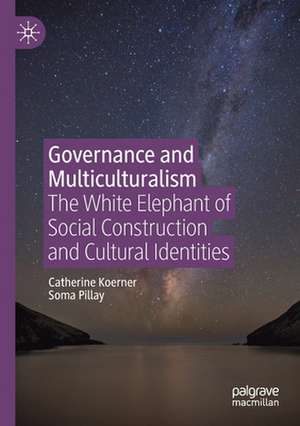Governance and Multiculturalism: The White Elephant of Social Construction and Cultural Identities
Autor Catherine Koerner, Soma Pillayen Limba Engleză Paperback – 25 aug 2020
| Toate formatele și edițiile | Preț | Express |
|---|---|---|
| Paperback (1) | 386.99 lei 6-8 săpt. | |
| Springer International Publishing – 25 aug 2020 | 386.99 lei 6-8 săpt. | |
| Hardback (1) | 391.79 lei 6-8 săpt. | |
| Springer International Publishing – 24 aug 2019 | 391.79 lei 6-8 săpt. |
Preț: 386.99 lei
Nou
Puncte Express: 580
Preț estimativ în valută:
74.06€ • 77.03$ • 61.14£
74.06€ • 77.03$ • 61.14£
Carte tipărită la comandă
Livrare economică 14-28 aprilie
Preluare comenzi: 021 569.72.76
Specificații
ISBN-13: 9783030237424
ISBN-10: 3030237427
Pagini: 284
Ilustrații: X, 284 p. 1 illus.
Dimensiuni: 148 x 210 mm
Greutate: 0.39 kg
Ediția:1st ed. 2020
Editura: Springer International Publishing
Colecția Palgrave Macmillan
Locul publicării:Cham, Switzerland
ISBN-10: 3030237427
Pagini: 284
Ilustrații: X, 284 p. 1 illus.
Dimensiuni: 148 x 210 mm
Greutate: 0.39 kg
Ediția:1st ed. 2020
Editura: Springer International Publishing
Colecția Palgrave Macmillan
Locul publicării:Cham, Switzerland
Cuprins
1. Introduction.- 2. Debating the nation: dealing with difference and incommensurability.- 3. The (white) elephant in the room: cultural identities and Indigenous Sovereignty in Australia.- 4. Methodological insights.- 5. Conceptualising cultural identity: the great divide.- 6. "We're multicultural mate!" Understanding Multiculturalism in Australia.- 7. Policy, Practice and Legislative Matters.- 8. Concluding Remarks.-
Notă biografică
Catherine Koerner is Academic Lecturer in Development Studies, Community and Human Services at Federation University, Australia. Her research includes colonialism/post-colonialism, hate-speech, identity, and Indigenous relations.
Soma Pillay is Senior Lecturer in Management at Federation University, Australia. Her research interests bridge cross-cultural studies, ethics, and public sector governance.
Soma Pillay is Senior Lecturer in Management at Federation University, Australia. Her research interests bridge cross-cultural studies, ethics, and public sector governance.
Textul de pe ultima copertă
A key intervention in the growing critical literature on race, this volume examines the social construction of race in contemporary Australia through the lenses of Indigenous sovereignty, nationhood, and whiteness. Informed by insights from white Australians in rural contexts, Koerner and Pillay attempt to answer how race shapes those who identify as white Australian; how those who self-identify thusly relate to the nation, multiculturalism, and Indigenous Sovereignties; and how white Australians understand and experience their own racialized position and its privilege. This “insider perspective” on the continuing construction of whiteness in Australia is analyzed and challenged through Indigenous Sovereign theoretical standpoints and voices. Ultimately, this investigation of the social construction of race not only extends conceptualizations of multiculturalism, but also informs governance policy in the light of changing national identity.
Caracteristici
Unique methodology to illustrate the dynamics between social constructs of race and identity, multiculturalism, and governance Examines the perspective of the rural “white” Australian, whereas most previous studies have focused on the urban context Explores trends in configurations of Australian identity, with practical implications for policy makers and government
